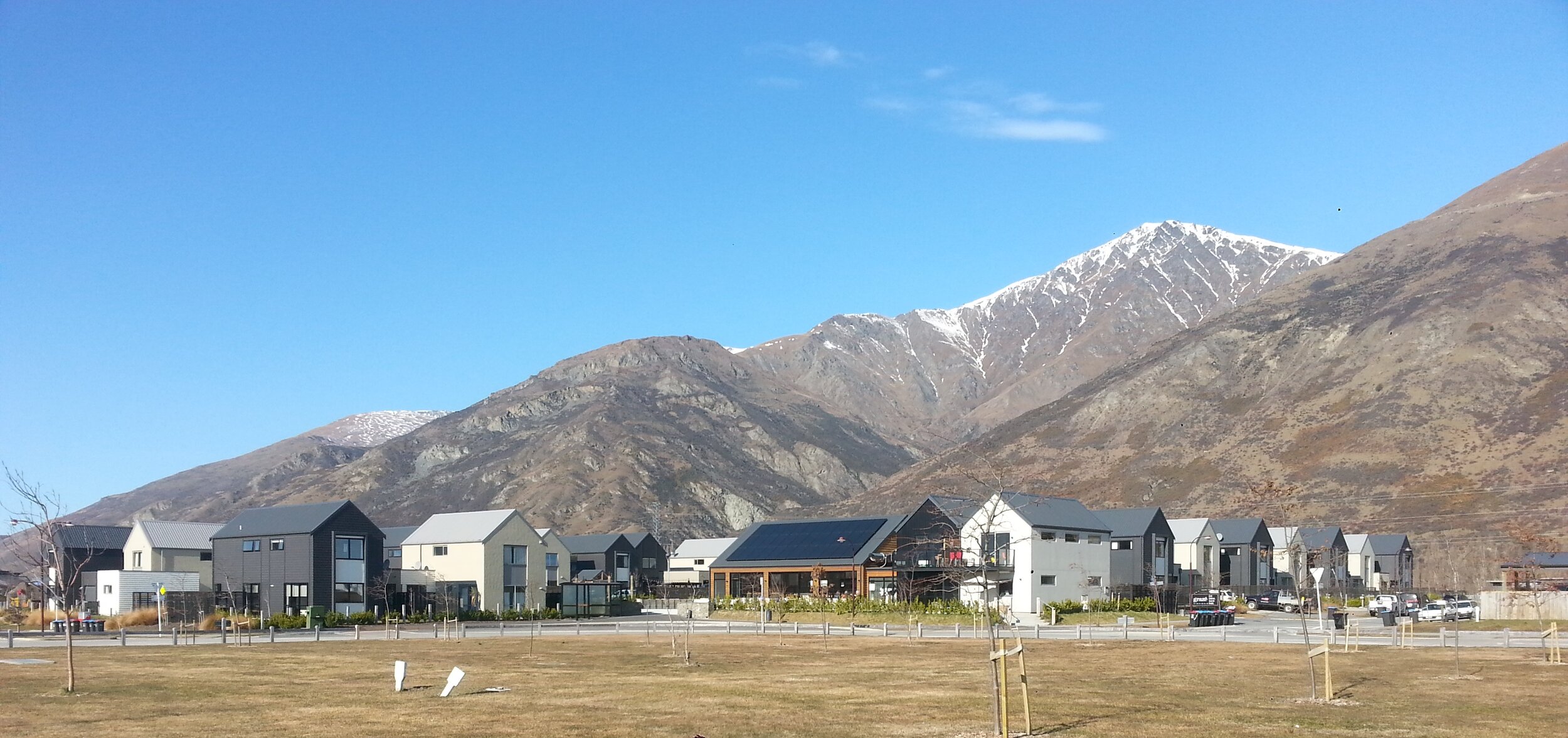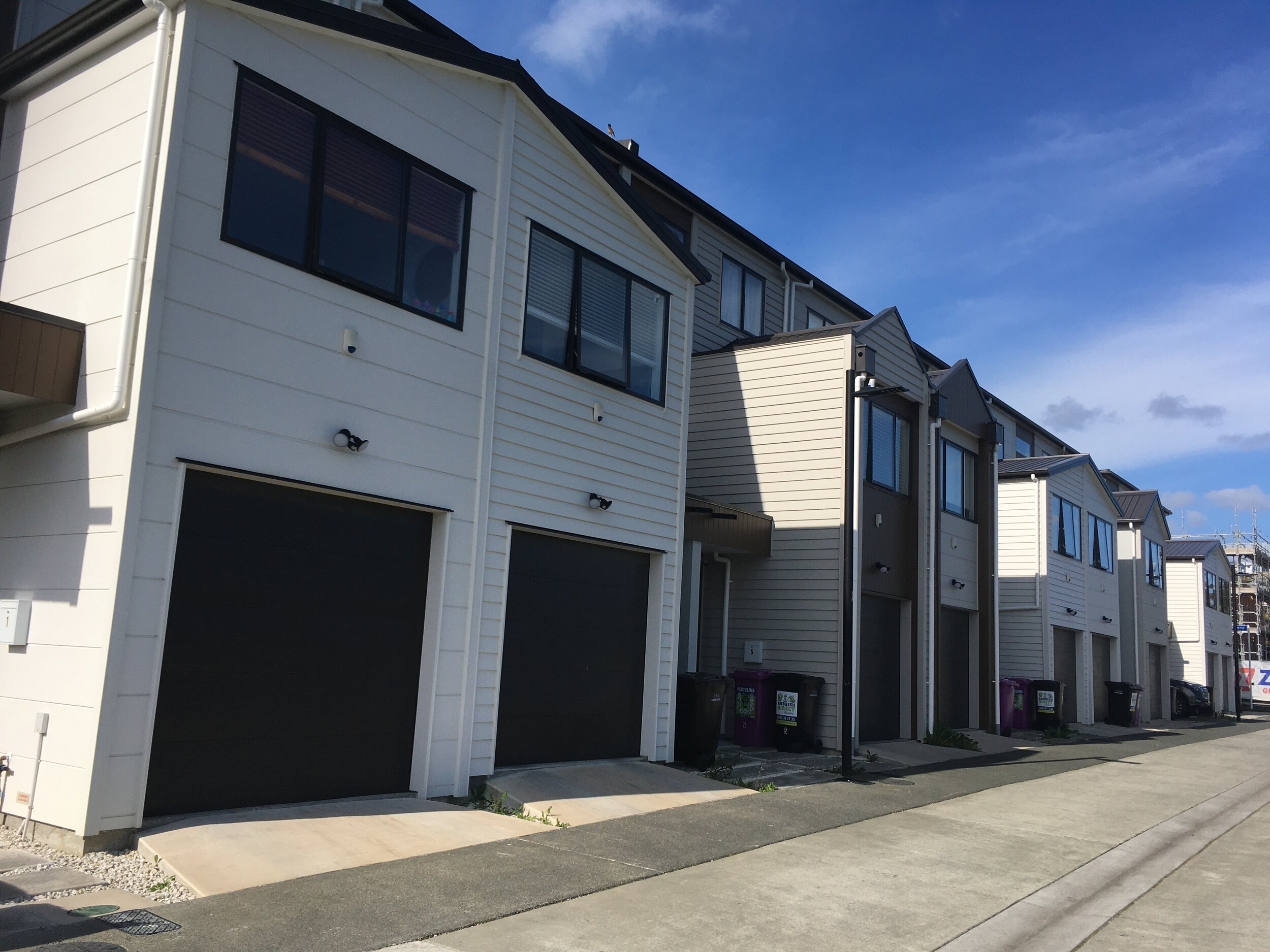The ‘gateway drug’ to Affordable Housing and why it needs to be our nation's new addiction.
Next week our Government will announce its final position on the direction it will take on our housing future. Given the urgency of our housing crisis will it adopt known solutions to increase affordable housing supply? Inclusionary zoning is a proven ‘gateway drug’ approach used successfully in Queenstown and internationally. We should be vocally supporting how this potential solution is being considered given the scale of opportunity NOW to address the growing housing divide.
Aotearoa New Zealand has a severe shortage of housing, particularly that which is affordable. This impacts everyone given we all need essential services, and those providing them need secure well located affordable homes. Solving our severe affordable housing shortage must become everyone's addition.
Queenstown Lakes Community Housing Trust’s flagship development, Nerin Square. Photo supplied by QLCHT.
Continuous, effective, and proven affordable housing supply is possible.
The solution is in ensuring that private developments over a certain size have a portion set aside for social and affordable housing. This approach is called Inclusionary Zoning and is the gateway to cheaper housing supply. It is proven and is already successfully used in many parts of the world, including Queenstown, Aotearoa New Zealand.
“Inclusionary zoning, which requires new developments to provide a component of that new supply (of housing) to be affordable, ensures that new supply also meets the needs of low-income and low-wealth citizens.” Shamubeel Eaqub
In 2007 the Queenstown Local Council identified a looming problem in the community. To address this, the Council implemented an affordable housing (typically 5%) contribution rule on larger developments. This has seen total contributions valued at $24m of land and cash directed to affordable housing for the region.
Let’s open the gateway for increasing affordable developments through Inclusionary Zoning. Photo by Imogen Schoots
Don’t we already have affordable housing sorted?
Our nation has limited existing affordable housing and few ways of generating more. The majority of current affordable homes are privately rented at our urban fringes. Often such housing is poor quality, requiring a car to access, and is far from services.
Housing is deemed affordable when it costs less than a third of household income.
We now know that KiwiBuild isn’t the affordable housing ‘gateway drug’ it was first pumped up to be. Future cost benefits are not paid forward to future occupants.
“There is no re-sale price cap for homeowners to on-sell their KiwiBuild home after they have satisfied their minimum ownership period. Kāinga Ora does not monitor if a homeowner who has satisfied their minimum-ownership period chooses to sell their KiwiBuild home.” The KiwiBuild Team
A recent newcomer to the affordable housing scene is the government-initiated Progressive Home Ownership (PHO) model. For the eligible, the cost of the home may be paid back over time. The initial purchase costs are shared with a provider, who takes a 15 year loan from the Government. The ownership arrangement could be through shared ownership, rent-to-buy, or leasehold. If a PHO household eventually buys the provider out and reaches independent ownership, then they are free to sell the property on the open market if they choose. There are already providers offering PHO who can be found via Kiwibuy.
Our nation's current ways of generating affordable housing isn’t close to the level of growth required for it’s population demands or income levels of essential workers. The ability to retain affordability enough beyond the first occupants is at crisis point. As part of the solution to this crisis, forever affordable housing models provide inheritable occupancy rights, ensuring sustainable housing in the community.
We are far from having affordable housing sorted in Aotearoa New Zealand. Competition for limited housing will only drive more people into poverty and homelessness. Secure quality housing is becoming completely out of reach for more and more people each year.
Demand only increasing
The working poor in need of affordable housing are mostly living a trapped renter existence. These people have a combined household income of less than $130,000 with a third or more of that income being spent on housing costs. For those with families and living in Auckland, this income does not go far. Not surprisingly many working poor are not eligible for a mortgage, nor are they likely to ever be!
Auckland Council has researched the size and growth of the working poor. This group is also referred to as the ‘intermediate housing market’ or the ‘missing middle.’ The 2019 pre-covid research findings put the figure of the working poor at roughly 250,000 people in Tāmaki Makaurau by 2028. Auckland housing crisis statistics are eye watering. That's even before the meteoric house price rises seen through Covid. Rent increases have followed close behind with median rents increasing by 8% in just the last year. We need to turn it around for generation rent. To offer a broader array of living options that inclusionary zoning could provide.
When inclusionary zoning is introduced correctly, affordable homes look like market homes. Photo by Imogen Schoots
Isn’t Inclusionary Zoning just a tax on developers?
The Central Government is currently working on planning reforms. These will enable large scale legal development ‘uplift.’ Greater density will be allowed resulting in more homes. We must capture some of this uplift in value to benefit those in need. The fair approach is that this uplift is shared, not just enabling more private profit. These sorts of opportunities rarely come along on this scale, offering the ability to right some substantial wrongs. The Queenstown Lakes District Council has been practicing this for the past 15 years.
When value uplift occurs through planning changes, a set percentage of the development should be provided as affordable housing through inclusionary zoning. Julie Scott, Executive Officer, Queenstown Lakes Community Housing Trust
We can expect some of our nation's developers to soon become more vocal in support of Inclusionary Zoning (IZ). Coupled with requests that IZ is introduced at a level playing field, therefore treating all players equally.
For IZ to be effective, it must be mandatory, applying to both new and re-developments. The same contribution must be required regardless of whether the development is in an urban infill setting or greenfield.
How do we spread the affordable housing supply load?
Our Central government developer, Kāinga Ora, is rightly focused on building homes at scale. Their focus is reducing the Public Housing waitlist, therefore multiple ways of increasing affordable housing supply are needed. Inclusionary Zoning is a proven method of increasing this supply. It also addresses the right to housing, prevents gentrification, and protects the vulnerable.
Enabling community-led developments is one such way that needs more government focus. See our previous blog post on Forever Affordable Homes’ views on the Central Governments' proposed changes to housing policy.
Debunking myths
Let the market decide - There is clear evidence that when the free market is not incentivized to provide affordable housing, it doesn’t. The free market decides to maximise private profit unless it is incentivised or mandated otherwise.
IZ decreases neighbouring property values - Research undertaken by Sense Partners for Community Housing Aotearoa found this wasn’t occurring in Queenstown.
It will increase crime and cause blight - Crime may continue where it already exists. IZ is coupled with a housing programme. The Housing Trust in Queenstown is a registered Community Housing Provider. It provides wrap-around services.
Homes that are created through Inclusionary zoning intentionally look all the same. Design etc is deliberately considered to ensure ghettos are not created. For analysis of IZ in Queenstown see here.
Let's keep what is working
Forever Affordable Homes support the effective and proven pathways for affordable housing supply in use for over a decade in Queenstown. We ask that you do too and support Option 4 in the Draft Strategy, which is to retain the current system. Have your say by 5 pm this Sunday (26 September). For more information see this link.
An equity injection
It is time to prioritise affordable housing for all and kick this habit of short-sighted private profiteering. It is time to apply tested and trusted tools. We must clean up our habits to give affordable housing the shot in the arm it so desperately needs.
Please comment on your personal living experiences.
What do you think the solutions are to our housing crisis that we should be adopting?
How do you live currently? Do you have friends and whanau in a critical living situation?
Do you have a great affordable housing story?
How many people do you know right now that would benefit from affordable housing?
What is this picture likely to look like in 10-20 years time for this current “generation rent” who haven’t been able to purchase a home?
Take action
Like and/or follow the Forever Affordable Homes Twitter, Facebook and instagram pages (see icons below)
Submit to support continuing Queenstown's affordable housing supply (see above)
Help spread the word on this solution via your networks and on social media. Comment below and share this post. Let's expand this critical conversation which impacts us all.



